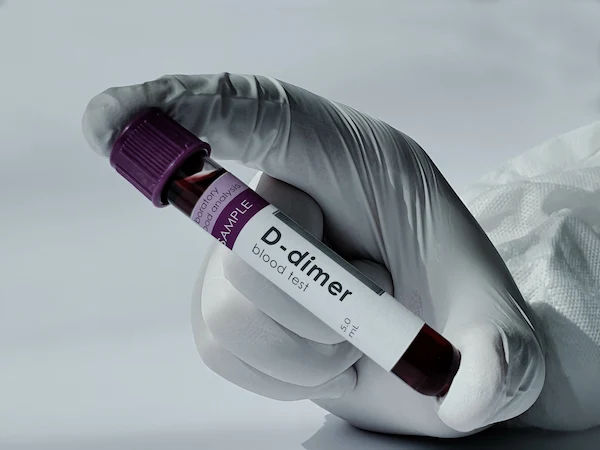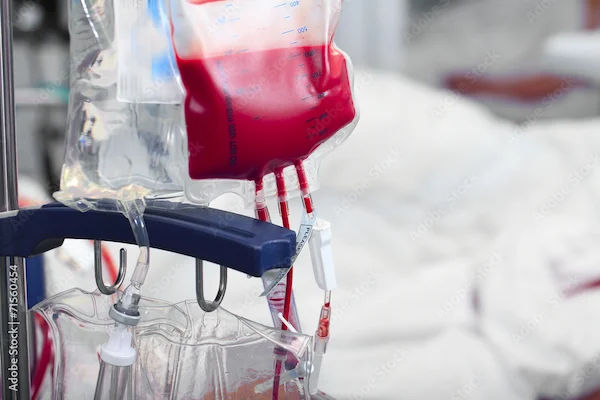D-Dimer Test: Full Form and Overview
Understand the D-Dimer Test: its full form, what it measures, and why this crucial blood test is used to detect blood clots, aiding in the diagnosis of conditions like DVT and PE.


Introduction
When you or a loved one is experiencing unexplained symptoms like swelling, pain, or difficulty breathing, doctors may recommend a D-Dimer test to check for blood clotting disorders. But what exactly is this test, and why is it important? Let’s break it down in simple terms.
What is a D-Dimer Test?
The D-Dimer test is a blood test that helps detect the presence of abnormal blood clots in your body. These clots can be dangerous if they form inside veins (a condition called deep vein thrombosis or DVT) or travel to the lungs (pulmonary embolism or PE).
Full Form of D-Dimer
The term "D-Dimer" refers to a small protein fragment that remains in the blood after a blood clot dissolves. It acts as a marker, indicating whether your body has recently tried to break down a clot.
Why is the D-Dimer Test Done?
Doctors recommend this test when they suspect conditions like:
1. Deep Vein Thrombosis (DVT) – A clot in the legs causing pain and swelling.
2. Pulmonary Embolism (PE) – A clot in the lungs leading to breathing difficulties.
3. Disseminated Intravascular Coagulation (DIC) – A severe condition where blood clots form throughout the body.
4. Stroke or Heart Attack Risk Assessment – To check for abnormal clotting.
Get Your Symptoms Assessed
Symptoms That May Require a D-Dimer Test
If you experience any of these symptoms, your doctor might suggest this test:
Leg pain, swelling, or redness (possible DVT)
Sudden shortness of breath or chest pain (possible PE)
Rapid heartbeat or coughing up blood
Unusual bruising or bleeding (possible DIC)
How is the Test Performed?
The D-Dimer test is a simple blood test:
1. A healthcare professional will draw a small blood sample from your arm.
2. The sample is sent to a lab for analysis.
3. Results are usually available within a few hours to a day.
Get Your Symptoms Checked By Top Specialists
Understanding Your D-Dimer Test Results
Normal (Negative) Result: If your D-Dimer levels are within the normal range, it’s unlikely you have a dangerous blood clot.
High (Positive) Result: Elevated levels suggest recent clot formation, but further tests (like an ultrasound or CT scan) may be needed to confirm the diagnosis.
Note: A high D-Dimer level does not always mean a clot is present. Other conditions like infections, pregnancy, or recent surgery can also increase D-Dimer levels.
What Can Affect D-Dimer Levels?
Several factors can influence your test results:
Age – Older adults may have slightly higher levels.
Pregnancy – Hormonal changes can increase D-Dimer.
Recent surgery or injury – Healing processes raise D-Dimer.
Chronic illnesses – Conditions like cancer or heart disease may affect results.
How to Manage High D-Dimer Levels?
If your test shows high D-Dimer levels, your doctor may recommend:
Anticoagulant (bloodthinning) medications to prevent clots.
Compression stockings (for DVT).
Lifestyle changes like staying active and hydrated.
Prevention Tips to Reduce Clot Risks
Stay Active – Avoid sitting for long periods.
Hydrate Well – Drink plenty of water.
Maintain a Healthy Weight – Obesity increases clotting risks.
Quit Smoking – Smoking affects blood circulation.
When to See a Doctor?
Seek immediate medical help if you experience:
Severe chest pain or breathing difficulties
Sudden leg swelling with pain
Coughing up blood
Book a D-Dimer Test with Apollo 24|7
If your doctor has recommended a D-Dimer test, you can easily book a test online through Apollo 24|7. With quick and reliable lab services, you can get tested from the comfort of your home or visit a nearby lab.
Final Thoughts
The D-Dimer test is a crucial tool in detecting blood clotting disorders early. While a high result can be concerning, it doesn’t always mean a serious problem—further tests are usually needed. If you have symptoms like unexplained swelling or breathing difficulties, consult your doctor promptly.
Consult Top Specialists
Get Your Symptoms Assessed
₹1250(₹3125)60% off
Get Your Symptoms Checked By Top Specialists

Dr. Lakshmi Sanjitha Kakani
General Physician/ Internal Medicine Specialist
6 Years • MBBS, MD (General Medicine)
Visakhapatnam
Apollo 24|7 Clinic - Andhra Pradesh, Visakhapatnam

Dr. Syed Yaseen Ahmed
General Practitioner
7 Years • MBBS
Hyderabad
Apollo 24|7 Clinic, Hyderabad

Dr. J T Hema Pratima
General Practitioner
9 Years • MBBS
Chennai
Apollo 24|7 Clinic - Tamilnadu, Chennai
(250+ Patients)

Dr. Md Yusuf Shareef
General Practitioner
8 Years • MBBS
Hyderabad
Apollo 24|7 Clinic, Hyderabad

Dr. Mohammed Huzef Ul Arifeen
General Practitioner
3 Years • MBBS
Hyderabad
Apollo 24|7 Clinic - Telangana, Hyderabad
Consult Top Specialists

Dr. Lakshmi Sanjitha Kakani
General Physician/ Internal Medicine Specialist
6 Years • MBBS, MD (General Medicine)
Visakhapatnam
Apollo 24|7 Clinic - Andhra Pradesh, Visakhapatnam

Dr. Syed Yaseen Ahmed
General Practitioner
7 Years • MBBS
Hyderabad
Apollo 24|7 Clinic, Hyderabad

Dr. J T Hema Pratima
General Practitioner
9 Years • MBBS
Chennai
Apollo 24|7 Clinic - Tamilnadu, Chennai
(250+ Patients)

Dr. Md Yusuf Shareef
General Practitioner
8 Years • MBBS
Hyderabad
Apollo 24|7 Clinic, Hyderabad

Dr. Mohammed Huzef Ul Arifeen
General Practitioner
3 Years • MBBS
Hyderabad
Apollo 24|7 Clinic - Telangana, Hyderabad




